Young People See Record High Joblessness

While the labor market is holding steady, it’s not a good time to be looking for a job—particularly if you’re young (The Wall Street Journal, subscription).
What’s going on: “Recent college and high school graduates are facing an employment crisis. The overall national unemployment rate remains around 4%, but for new college graduates looking for work, it is much higher: 6.6% over the past 12 months ending in May.”
- That’s the highest level for this age group in a decade, not counting the COVID-19 unemployment increase.
- By contrast, jobseekers aged 35 to 44 with bachelor’s degrees had a 2.2% unemployment rate over the past year.
What’s different now: “Young graduates typically face a higher unemployment rate than their counterparts who have been in the workforce longer, but the gap is growing wider between older workers and the young.”
Why it’s happening: There’s a general slowdown in hiring right now.
- While it hasn’t had much of an effect on people who already have jobs (because layoffs have stayed low), it has hit those with the least experience.
- “With employers turning more cautious on hires, they are less inclined to gamble on workers with thinner résumés or skill sets.”
Worse for high school grads: “High school graduates ages 18 to 19 with no college [experience] averaged an unemployment rate of 14.5% over the past 12 months. That is up from 13.3% over the prior 12-month period.”
Manufacturing’s offer: With 381,000 job openings today, and as many as 3.8 million new employees needed by 2033, the manufacturing industry has many opportunities both for new college graduates and those without a college degree.
- The Manufacturing Institute, the NAM’s 501(c)3 workforce development and education affiliate, is creating solutions for employers seeking workers with much-needed skills and offers programs and resources for students, veterans and other job seekers looking to enter the industry. Learn more here.
Don’t Miss the MI’s Annual Workforce Summit

With 2025 shaping up to be another challenging year for manufacturers, amid evolving workforce needs, rapid technological advancements and economic uncertainty, the Manufacturing Institute is offering much-needed help. The annual Workforce Summit put on by the NAM’s workforce development and education affiliate is a can’t-miss event where manufacturers can learn what works and how peers are addressing all these challenges.
What’s going on: This year’s summit, whose theme is “Manufacturing America’s Talent,” will be held Oct. 20–22 in Charlotte, North Carolina.
- Attendees will participate in sessions and interactive workshops that focus on topics like workforce preparation for AI deployment, expanding the military-to-manufacturing pipeline, closing the skills gap in hires with no factory experience, how to design optimal onboarding programs and much more.
- Sponsors include Dozuki, Grant Thornton, American Fidelity, TCP, Cornerstone OnDemand, MSSC and MyWorkChoice.
Why attend: At the Workforce Summit, manufacturers will be able to connect with subject-matter experts, community partners and education professionals to brainstorm and get answers about common challenges facing the sector.
- The vast majority—95%—of past attendees give the workshops four to five stars (out of five), according to the MI.
Who should attend: The Workforce Summit brings together the entire manufacturing talent chain and delivers fresh solutions for the industry’s most pressing workforce challenges. If you shape strategy, develop skills or build partnerships, this event is for you.
Register: Register for this year’s event here (but hurry—discounted early bird registration ends July 15). Contact [email protected] with any questions.
Read more: Read all about our two most recent Workforce Summits here and here.
GE Appliances Opens Onsite Clinic for Employees in Tennessee

GE Appliances, a Haier company, has opened an advanced primary care clinic onsite at its Monogram Refrigeration LLC plant in Selmer, Tennessee, the company announced this week.
What it does: The third onsite clinic at a GE Appliances facility, the Selmer clinic will serve employees and covered family members who are at least 2 years old. It is offered in addition to traditional health care benefits, the company said, and it will be managed by third-party health care provider CareATC. The clinic’s services include:
- Advanced primary care;
- Mental health services;
- Access to a registered dietician; and
- Prescription services for common medications.
Impressive results: GE Appliances’ existing two clinics have shown impressive results in caring for employees, most notably a 35% increase in preventative care visits and a 70% reduction in avoidable ER visits among employees using the clinics.
- Employees average 4.82 visits per year—which is far more than the industry benchmark, according to GE Appliances.
GE Appliances says: “In today’s fast-paced world, providing accessible and comprehensive health care is more important than ever—especially in rural manufacturing communities,” said GE Appliances Chief Human Resources Officer Rocki Rockingham.
- “This clinic is more than a benefit; it’s a key part of our strategy to be an employer of choice and attract and retain the talent we need to operate and grow in a competitive labor market. Our employees deserve the best, and that includes health care that’s close to work, easy to access and focused on their whole well-being.”
The MI says: The Manufacturing Institute, the workforce development and education affiliate of the NAM, supports manufacturers in their efforts to offer high-quality benefits to workers, including medical care.
- “When manufacturers invest in the holistic well-being of their workforce, they’re doing more than offering benefits—they’re making a powerful statement that their people are their greatest asset,” said MI President and Executive Director Carolyn Lee.
- “These investments in people play a critical role in both attracting and retaining talent. At the MI, our research consistently shows that team members are more likely to stay—and thrive—when they believe their employer truly cares about them. It’s not just the right thing to do; it’s a smart strategy for attracting and retaining the skilled talent that drives our industry forward.”
Why Manufacturers Can’t Fill Their Job Openings

Manufacturers struggle to fill all available jobs, Manufacturing Institute President and Executive Director Carolyn Lee told NPR’s “Planet Money” this week. The program held an in-depth discussion with Lee and other experts about the industry’s workforce challenges and prospects for change.
The problem: “Last year, the Manufacturing Institute [the NAM’s workforce development and education affiliate] and Deloitte, a consultancy firm, surveyed more than 200 manufacturing companies. More than 65% of the firms said recruiting and retaining workers was their No. 1 business challenge,” NPR noted.
- “The Manufacturing Institute and Deloitte projected that the industry will need 3.8 million additional workers by 2033 and that as many as ‘1.9 million of these jobs could go unfilled if workforce challenges are not addressed.’”
Changing perceptions: Lee underlined the importance of changing Americans’ perceptions of the manufacturing industry and showing them that it is not dirty, boring and repetitive but modern and high tech.
- Manufacturing jobs are “clean and bright and full of technology,” Lee told NPR.
Skills shortage: Another problem facing the industry is a lack of people with specific, highly needed skills.
- “The hardest skills to find are the ones that maintain and fix equipment,” Lee says. “Every company we speak with is trying to hire technicians—every single one. The challenge is that there is no one walking around on the street with these skills, and it takes one to two years to teach those skills and another one to two years to contextualize those skills to the specific plant environment.”
The fix: Lee said that manufacturers have the most success in strengthening their workforces when they think local.
- “The very best models of workforce development that we see and that we engage in at the Manufacturing Institute are locally and regionally led public–private partnerships, where manufacturers come to the table—and with the support of the community college system and the local business community—they build the talent pipelines that they need,” she told the news outlet.
Finding FAME: The MI is also contributing directly to solving the skills shortage, including through the expansion of FAME, an earn-and-learn initiative originally founded by Toyota and now led by the MI that combines hands-on job training with classroom education.
- “[A]t the end of the 21 months [in the program], students come out with, in most cases, no college debt,” Lee said. They are also well set up for a lifetime of high-paying, in-demand work.
- A Brookings Institution and Opportunity America study cited by NPR found that “five years after completion, FAME graduates were earning nearly $98,000, compared to roughly $52,783 for non-FAME participants—a difference of more than $45,000 a year.”
Read the whole thing: You can find the whole NPR article here.
Anheuser-Busch Partners with the Manufacturing Institute on Workforce, Veterans’ Careers
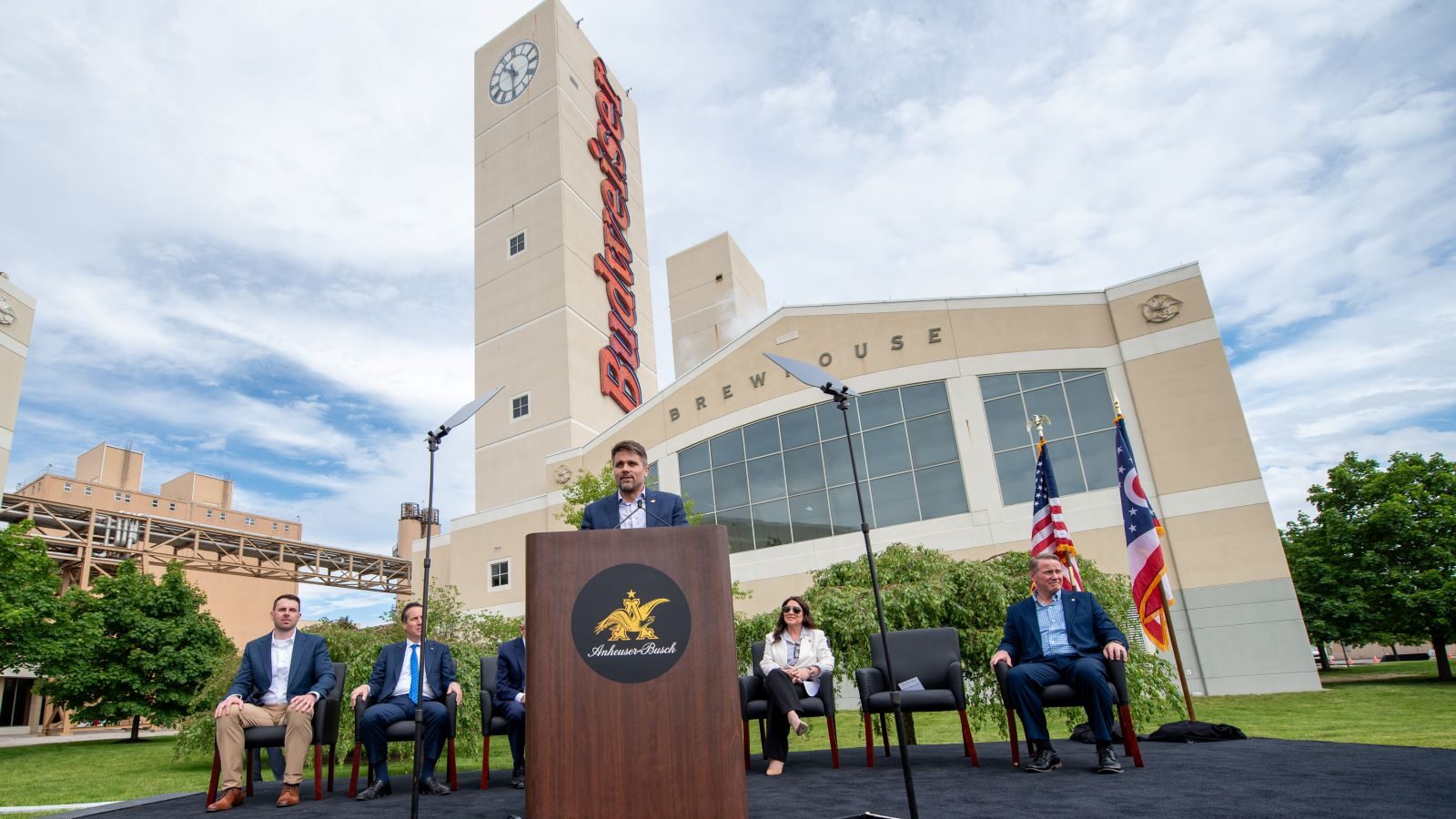
Anheuser-Busch, the maker of Budweiser and Bud Light among other products, is investing more than $300 million in local communities and facilities in 2025, including in efforts to upskill its workforce and help veterans find new careers at the company (Anheuser-Busch).
- This investment is a continuation of the more than $2 billion Anheuser-Busch has poured into 100 facilities across America over the past five years.
Heroes MAKE America: To support veterans in their new careers, Anheuser-Busch is partnering with the Manufacturing Institute—the NAM’s workforce development and education affiliate—to become the first manufacturer in the U.S. to adopt the MI’s new digital credentialing system for veterans.
- This system, overseen by the MI’s Heroes MAKE America initiative, translates military experience into skills needed for manufacturing careers, making veterans’ backgrounds more comprehensible to hiring managers.
- Anheuser-Busch will also train its workforce on the credentialing system, so that they understand the important skills that veterans will bring to the company and can evaluate the thousands of applications it will receive using the system.
Workforce training: Anheuser-Busch is also expanding its Technical Excellence Center model across the country, following its great success in St. Louis. The first new center will be its Columbus, Ohio, Regional Excellence Center, where it “will upskill its entire regional technical workforce over the next three years,” according to the company.
- The MI has a role in this expansion as well. Anheuser-Busch will partner with the MI and local trade schools so that trade school students and educators can benefit from the St. Louis and Columbus Technical Excellence Centers.
Anheuser-Busch says: “This new $300 million investment in our manufacturing facilities across the U.S. is the latest example of Anheuser-Busch’s commitment to strengthening our local communities by creating and sustaining jobs and driving economic prosperity,” said Anheuser-Busch CEO Brendan Whitworth. “Investing in our people and in new technologies and capabilities to drive industry and economic growth is core to who we are.”
From the MI: “Anheuser-Busch’s $300 million investment is more than a commitment to manufacturing in America—it’s a commitment to America’s future,” said NAM President and CEO and MI Chairman of the Board Jay Timmons.
- “By expanding technical training and strengthening our industrial base in Columbus, and with their support of the Manufacturing Institute’s Heroes MAKE America initiative, they are opening doors of opportunity for manufacturing workers across this country.”
- “This investment will help fuel our economy, lift up communities and secure the promise of manufacturing in America for generations to come.”
On the ground: The announcement of Brewing Futures took place in Columbus, Ohio, with Whitworth, Secretary of Labor Lori Chavez-DeRemer, Ohio Gov. Mike DeWine and Sens. Jon Husted and Bernie Moreno. Marking the significance of the announcement, MI President and Executive Director Carolyn Lee and NAM Executive Vice President Erin Streeter also attended the event.
- “It was great being on the ground in Columbus, Ohio, for this announcement with Brendan Whitworth and Secretary Chavez-DeRemer highlighting Anheuser-Busch’s commitment to supporting veterans and advancing our workforce,” said Lee.
- “Through our Heroes MAKE America initiative, we’re proud to partner with forward-thinking manufacturing leaders like Anheuser-Busch who are proactively building supportive communities of veterans within their organizations. By adopting tools like our Manufacturing Readiness Badge program, they are not just investing in people; they are helping shape the future of manufacturing.”
- “This investment will help fuel our economy, lift up communities and secure the promise of manufacturing in America for generations to come.”
Women MAKE Awardees Inspire, Honor One Another at This Year’s Gala
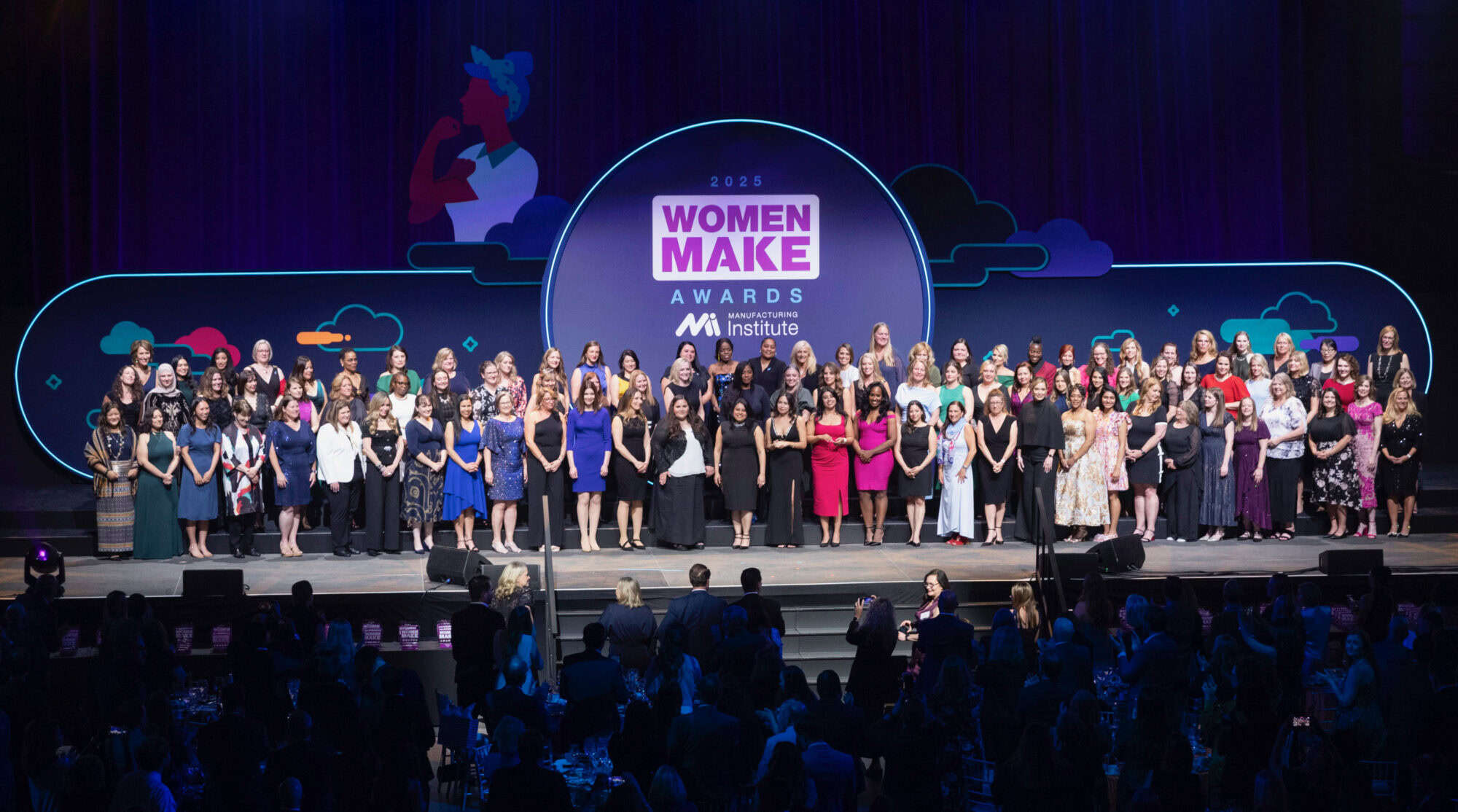
The 2025 Women MAKE Awards gala had it all—deserving winners, inspiring talks, live music, camaraderie among manufacturing professionals and more.
A night to remember: The event, held Thursday night at Washington, D.C., waterfront concert venue The Anthem, is put on annually by the Manufacturing Institute, the NAM’s 501(c)3 workforce development and education affiliate. It honors exceptional leaders in the manufacturing industry who were nominated by their peers: 100 leaders (“Honorees”) and 30 rising stars (“Emerging Leaders”).
- The names of the 130 awardees at the gala—sponsored by Toyota Motor North America, Union Pacific, Hitachi Energy, Caterpillar and Novelis—were announced in March.
- The awards, now in their 13th year, are part of the MI’s Women MAKE America initiative, which aims to close the skills gap in manufacturing and inspire the next generation who will become leaders in the industry.
What happened: The elegant evening featured a live performance by folk-rock singer Jade Bird and remarks by NAM President and CEO and MI Chairman of the Board Jay Timmons, MI President and Executive Director Carolyn Lee and various manufacturing leaders.
“Now is the time”: One of Bird’s songs, “Now is the Time,” inspired Timmons’ message at the gala.
- “‘Now is the time’—that lyric couldn’t be more fitting,” Timmons said. “Now is the time to stand up. Now is the time to be heard. Now is the time to be recognized for the contributions that the remarkable women in this room are making not only to manufacturing but also to the health and the strength of our nation and the world. … You’re the proof of what’s possible—and what’s powerful—when women have a hand in shaping the future of manufacturing.”
Good people doing good: The gala was preceded by two days of leadership programming for Honorees and Emerging Leaders. In addition to various panels and workshops, the program made time for the awardees to give back.
- At a hands-on service event on day one of the program sponsored by L’Oreal, the Honorees and Emerging Leaders assembled 200 personal hygiene care packages for residents of the Washington, D.C., nonprofit N Street Village, which is dedicated to supporting women experiencing homelessness.
- The awardees feted at the gala aren’t strangers to philanthropy. The charitable activities of 2025 Honoree Anam Ahmed and 2025 Emerging Leader Jordan English are a prime example of what’s all in a day’s work for these award winners.
- In addition to being the youngest site representative on the Kuraray America Incorporated Global Production and Manufacturing Committee and serving as both process and production engineer, Texas-based Honoree Ahmed volunteers regularly at Ronald McDonald House, food drives and Habitat for Humanity.
- English, a project engineer at Nucor Steel Tuscaloosa in Alabama, is “helping make a game-changing, multimillion-dollar overhaul to Nucor’s manufacturing process,” Lee said in her remarks at the event. “That’s making life better for the hundreds of people Jordan works with—all while she lifts up fellow engineers in her community” through mentorship and fundraising.
A story like her own: Toyota Motor North America Executive Technical Advisor, Toyota Global and North American Sustainability Susan Elkington, a former Awards Honoree, was this year’s gala chair.
- “I know how meaningful this moment is,” Elkington told the audience. “In 2014, I had the privilege of sitting where you are now, as a Women MAKE Honoree. I remember looking around the room, inspired by the stories and the sisterhood and our allies. I left that night with renewed energy and a deeper sense of responsibility—to grow, to give back and to lead by example.”
- “My story is unique, just like yours, but we go beyond our own stories, bonding together toward something even bigger,” she continued. “You’re not only achieving incredible things—you’re reaching back, paying your talents forward and lighting the way.”
Champion Award: New this year was the giving of the Champion Award, which “recognizes a leader in manufacturing who is committed not just to building great things but to empowering others,” Lee said. The first recipient: Cargill Senior Vice President of Manufacturing and Supply Chain Food North America Matt Pearson.
- This new award is given to “a transformative executive leader who has made extraordinary contributions to advance leaders in manufacturing”—and is chosen through a blind review by peer judges.
- At Cargill, Pearson has led multiple employee programs to support and create advancement pathways. He has also mentored many fellow Cargill workers.
- “Congratulations to Matt Pearson, SVP of Manufacturing & Supply Chain Food North America at Cargill, on being named the inaugural Champion Award recipient!” the MI wrote in a social post following the event. “Selected by peers, Matt exemplifies the leadership, mentorship & innovation that strengthen our industry.”
The last word: As Lee explained at the event, the leaders honored with this year’s awards “show us what modern manufacturing is all about and what it can be far into the future. As the Manufacturing Institute builds the manufacturing workforce of today and tomorrow, Women MAKE is an important part of the effort to close the skills gap.”
For This Pella Corp. Leader, Manufacturing Is an Easy Sell

When JaNette Barnett, vice president of field sales at Pella Corporation, is asked why she has spent nearly 30 years of her career in manufacturing, the answer comes easily. “I have always been drawn to the home improvement space, so it’s no surprise that my manufacturing experience has been centered in that sector—from cabinetry to lightbulbs, to plumbing to paint, and now windows.”
- “What makes this [sector] interesting to me is it delights our end consumer. It puts a smile on their face when they can transform their spaces in ways that make them feel at home.”
Barnett channels this joy into her efforts to modernize Pella’s sales team, a track record that won her recognition as part of the 2025 Women MAKE America Awards. Created by the Manufacturing Institute, the NAM’s workforce development and education affiliate, the awards honor 130 individuals who have achieved excellence in the manufacturing industry.
Barnett and the other honorees, selected by a panel of peers, will be celebrated at the Awards gala in Washington, D.C., on April 24, but we caught up with her earlier about her decades-long experience in the industry and advice for young people just starting out.
Her achievements: Barnett has been a game-changing leader for Pella’s field sales team, delivering a 30% year-over-year sales increase in 2024.
- Thanks to her extensive experience at previous companies, she has reconfigured its sales territories, overseen an expansion of the company’s sales team and improved its compensation structure—all of which has led to impressive engagement levels among Pella’s field sales personnel.
- Beyond that, Barnett is a highly respected mentor of young professionals at Pella and runs a foundation she named for her grandmother, the Betty Jefferson Memorial Fund, to support the education of Black, inner-city young people just as her grandmother did.
How it all began: As Barnett tells it, she fell into manufacturing two decades ago while looking for a job in marketing. She accepted a job in sales, but when she arrived, she found she’d been assigned to the production scheduling department instead—a job that involved walking the factory floor in steel-toed boots.
- “It wasn’t what I signed up for, but it was the best pivot ever,” said Barnett. “It put me in the heart of manufacturing—and as a sales and marketing leader, it gave me a different perspective on how products are made.”
Gaining insight: Her experience on the factory floor has informed her work ever since, even after she moved on to the corporate side of manufacturing. Today, she emphasizes that her holistic view of manufacturing impacts how she thinks about her sales work at Pella.
- “I truly believe that manufacturing is the heartbeat of the organization,” said Barnett. “Too often, that gets lost from a sales and marketing lens. We don’t always have a clear sense of the people behind the product getting made.”
Mentoring others: Barnett emphasized the importance of mentoring in introducing more people to the manufacturing industry. Especially at a time when manufacturing faces a significant employment gap—with more than 450,000 job openings today and an estimated 3.8 million positions needing to be filled by 2033—it is crucial to reach individuals who might not otherwise consider a career in the industry, she pointed out.
- “I believe mentoring is a form of paying it forward and bringing others along,” said Barnett. “There’s a need to bring new and fresh ideas to these places. And if people have aspirations to be in leadership, it’s my honor to help mentor them and help them understand that they can do the things they set their sights on.”
The last word: “My message has always been: You’re needed,” said Barnett. “We need you in this space. We need everything you can bring to the table.”
The Innovators Quest Gets Students Excited About Manufacturing
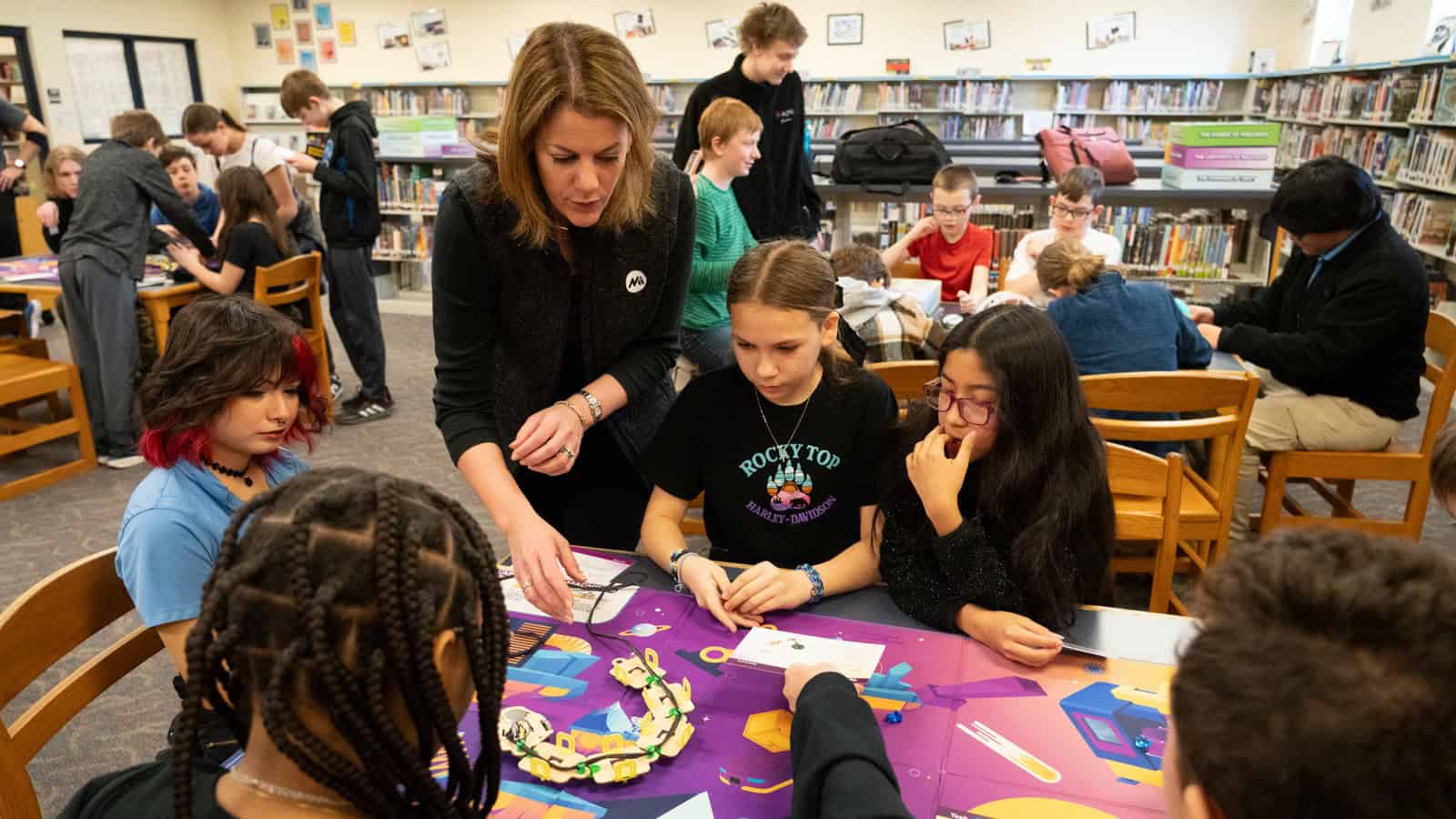
Manufacturers have a new opportunity to connect with students and encourage them to explore careers in manufacturing. The Manufacturing Institute (the NAM’s workforce development and education affiliate) has developed a gamified experience called Innovators Quest, specially designed to introduce students to manufacturing-related skills in a fun-filled format.
The experience is made up of four realms in a board game format with hands-on building challenges. As they seek to recover the “Crystal of Innovation,” students in grades 4 through 9 can try their hands at 3D printing, robotics and other crucial skills. Manufacturers can sponsor Innovators Quest sets, which they can take to schools, afterschool programs, local community events, Boys and Girls Clubs and more.
The quest: The conceit of the game is that the aforementioned crystal has fractured, and the students must fix it by completing four challenges in whichever order they choose.
- While the students play collaboratively, completing challenges together, they all take on the role of different innovator characters who have different mixes of manufacturing-related strengths, including “analytical, visual, intuitive, strategic and extroverted.”
- “We want all students to see themselves in at least one of these characters,” MI Director of Student Engagement Jen White explained to us.
The challenges: The four challenges ingeniously explore manufacturing concepts while still entertaining the participants, as the writer of this article can vouch.
- One challenge instructs students to build paper airplanes. But the lesson isn’t just about building—it’s about perfecting and testing your products. The players must make 10 airplanes following two separate designs, then put together an electric plane launcher. Finally, they test their airplanes to see if they sail the necessary 6 feet to “fly away” with a handful of the crystal fragments. Skills and concepts learned: collaboration, iteration, precision, electromechanical building, aerodynamics, following directions and testing.
- A second challenge draws on the principles of additive manufacturing. Players are asked to use 3D pens (which dispense a line of malleable plastic that can be made into shapes or figures) to construct the pieces of a bridge over which the crystal fragments must be transported. Skills and concepts learned: additive manufacturing, precision, following a blueprint, welding parts together, collaborating on different pieces and structural integrity.
We won’t spoil the other two realms, but they involve a similar blend of fun challenges and manufacturing skills exploration—including the construction of a small robotic toy and a test of deductive reasoning.
The bottom line: “Innovators Quest was developed based on proven approaches to empower manufacturing employers to engage students early and often,” said MI President and Executive Director Carolyn Lee. “By sparking their interest in skills needed in modern manufacturing, this student engagement tool illustrates the limitless possibilities of the many careers in our industry. The time to invest in our future workforce is now.”
- “Innovators Quest is an important initiative that will provide students with early knowledge about the variety of opportunities for a career in manufacturing and highlights the value of teamwork, collaboration and communication in the production environment,” said American Honda Motor Co. Executive Vice President Bob Nelson. “We’re proud to continue our partnership with the Manufacturing Institute to build that future workforce.”
Learn more: Learn more about Innovators Quest and how your company can sponsor a kit to build manufacturing career awareness in your community. To secure a sponsorship before the 2025–2026 school year begins, contact [email protected].
Women MAKE Awards to Honor Outstanding Women in Manufacturing
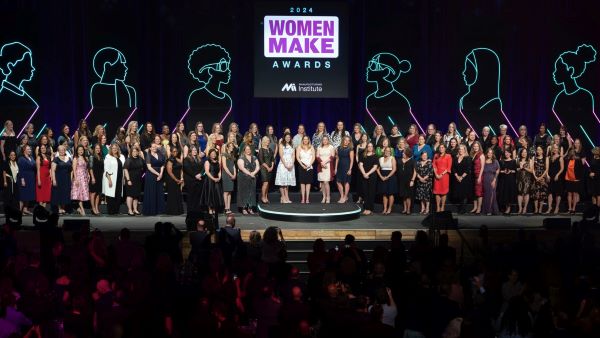
The Manufacturing Institute—the workforce development and education affiliate of the NAM—has announced the recipients of the 2025 Women MAKE Awards, honoring some of the most impressive and inspiring women in the manufacturing industry today.
The awards, which will take place in Washington, D.C., on April 24, will highlight 130 individuals who have demonstrated excellence and leadership in their careers across all levels of the manufacturing industry.
The challenge: The manufacturing industry faces a significant talent gap—with more than 400,000 job openings and an estimated 3.8 million positions needing to be filled by 2033.
- Women make up about half of the U.S. labor force, but less than one-third of the manufacturing workforce. Boosting the numbers of women who choose a career in modern manufacturing is essential to closing this gap—and the honorees of the Women MAKE Awards are leading the way.
The initiative: The MI’s Women MAKE America Initiative strengthens the modern manufacturing workforce by elevating and highlighting the women leading the industry at every level—from the shop floor to the C-suite—in order to inspire the next generation and help close the talent gap in the industry.
The awards: Each year, 100 Honorees and 30 Emerging Leaders are chosen from the thousands of nominations submitted to the MI by their peers for making significant contributions to their companies, communities and efforts to cultivate the next generation of skilled talent. Since its inception, the Women MAKE Awards have recognized about 1,700 outstanding individuals.
The MI says: “Every year, more women are finding opportunity and breaking barriers in manufacturing,” said MI President and Executive Director Carolyn Lee. “By elevating these outstanding women for their success, we are showing young women—and everyone else—that manufacturing is a rewarding industry with unlimited potential.”
- “At a time when there is such high demand for talent in our sector, these extraordinary women demonstrate the impactful careers that are available. By elevating role models who are paying it forward, the Women MAKE Awards strengthen the future of the industry by inspiring the next generation.”
Manufacturing leaders say: “With hundreds of thousands of open jobs in manufacturing, it has never been more critical to attract and retain top talent,” said Toyota Senior Vice President of Electric Vehicle Supply Susan Elkington.
- “This year’s Women MAKE Honorees and Emerging Leaders are breaking barriers, leading with innovation and proving there is no limit to what they can achieve in our industry. By amplifying their stories and accomplishments, we inspire others to step into manufacturing and shape its future.”
Learn more: Read about the awardees and learn more about the awards gala.
How FAME Supercharged a Mom’s Manufacturing Career
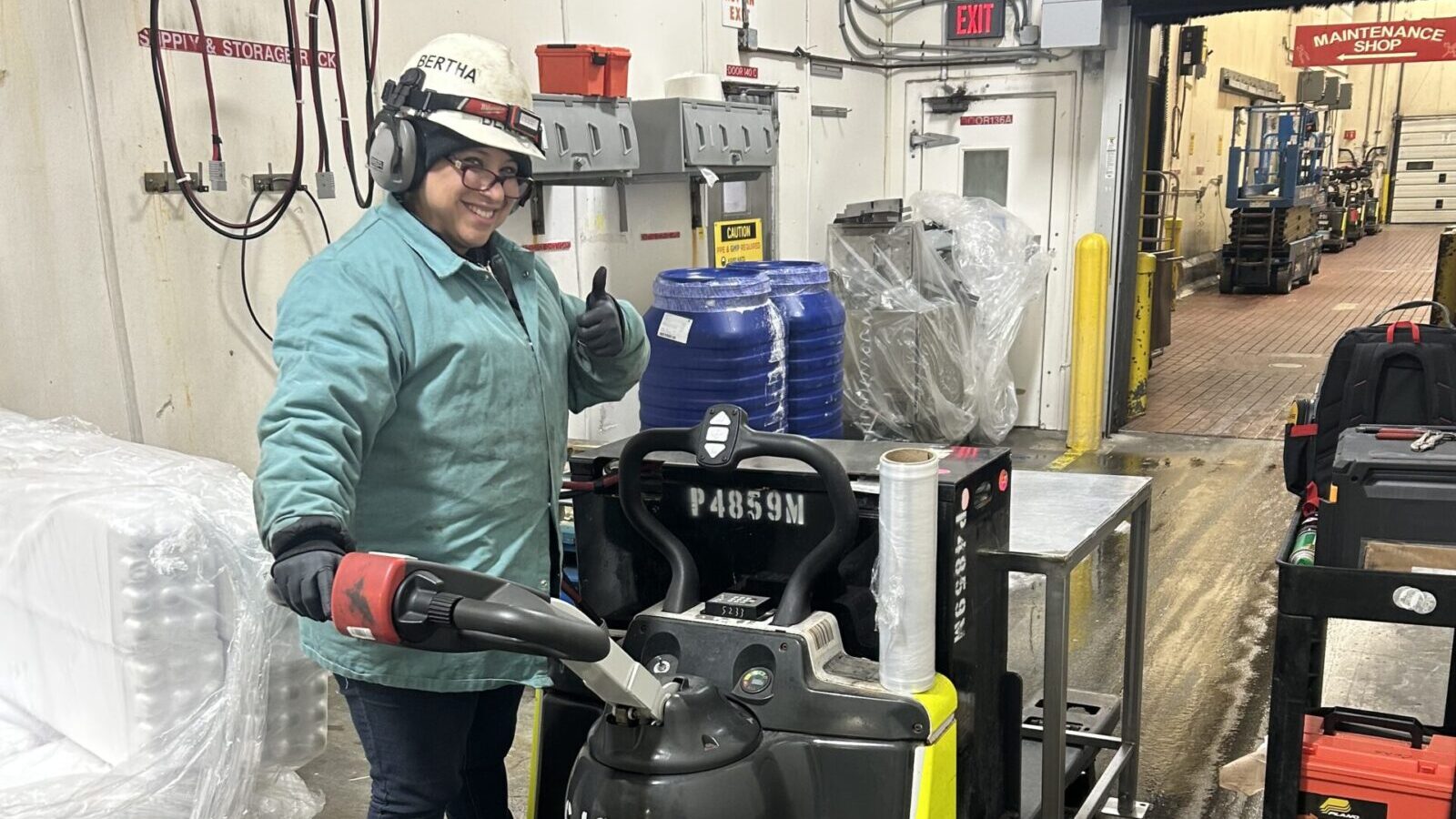
Bertha Ostiguin thought for years about going back to school. She had left the workforce to be a stay-at-home mom, and when she started working in production at H-E-B, she was still raising two boys at home. The idea of working part time while also studying and raising her kids felt daunting. But about six years into her manufacturing career at H-E-B, she joined the Advanced Manufacturing Technician program through TX FAME – Alamo in Alamo, Texas—more than 25 years after she was last in school.
“Honestly, I was scared that I wasn’t going to be able to make it,” said Ostiguin. “But it has been one of the best choices I’ve made. … I love it, I love what it does, and I cannot talk enough about it.”
The program: Founded in 2010 by Toyota and operated today by the Manufacturing Institute—the workforce development and education affiliate of the NAM—FAME aims to help students become highly skilled, sought-after workers capable of meeting the needs and challenges of the modern manufacturing sector.
- It provides current and aspiring workers with on-the-job training and classroom education, leading to an associate’s degree and the FAME certificate.
The opportunity: While Ostiguin was already several years into a manufacturing career, her experience at FAME has helped to expand her skillset, allowing her to advance her career at H-E-B and set herself up for greater success throughout her working life.
The benefits: In addition to teaching specific qualifications and in-demand technical skills, FAME helps to provide participants with the soft skills and professional behaviors they’ll need to succeed in today’s workforce, like communication. According to Ostiguin, it made her a better mentor to other people at work.
- “As I’m learning these things, I’m also teaching the young guys,” said Ostiguin. “And I would tell them, from my experience, why all this makes a difference.”
A model for others: In an industry that often has more men than women, Ostiguin saw early on that she was setting an example for others. She promised herself that she was going to finish the program—not just for herself and her sons, but for other women in manufacturing who might follow her lead. Ultimately, Ostiguin became the first woman from H-E-B to complete the FAME program, at the top of her class.
- “I started seeing the impact it was having for females, and how it wasn’t just about me anymore—it was about the bigger picture,” said Ostiguin.
A word of advice: Ostiguin is proud of what she has accomplished and encourages others to take advantage of opportunities to increase their knowledge and improve their skills.
- “Absorb as much as you can, and ask the questions that you have to ask,” said Ostiguin. “That’s the only way we’re all going to learn.”
From the MI: “FAME isn’t just transforming careers—it’s strengthening companies,” said MI President and Executive Director Carolyn Lee. “Bertha’s journey shows how investing in workforce development creates highly skilled employees who bring immediate value to their employers and themselves, creating a winning combination for long-term success.”